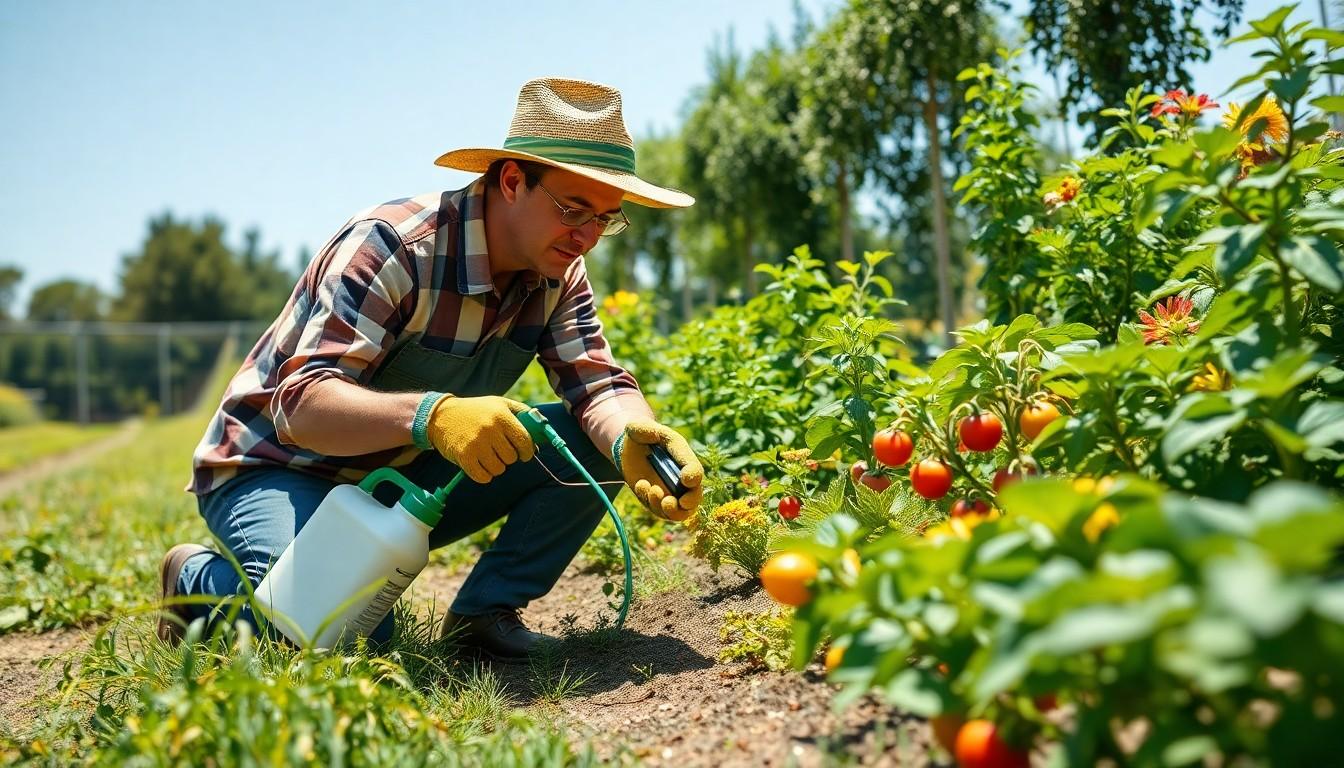The Best Fluffy Pancakes recipe you will fall in love with. Full of tips and tricks to help you make the best pancakes.

Weed Killer Safe for Vegetable Garden: The Best Natural Solutions You Need
Weeds can be the uninvited guests at the garden party, crashing in and stealing the spotlight from your precious veggies. But fear not, there’s a solution that won’t turn your garden into a toxic wasteland. Enter weed killers that are safe for vegetable gardens—your new best friend in the battle against those pesky green invaders.
Understanding Weed Killers
Weed killers, also known as herbicides, play a crucial role in managing unwanted plants in gardens. Various types exist, some targeting specific weed species while others offer broad-spectrum solutions. Organic weed killers utilize natural ingredients, making them suitable for vegetable gardens. These products focus on disrupting weed growth without adversely affecting desired plants.
Chemical herbicides, on the other hand, may contain synthetic compounds that can harm beneficial insects and soil health. Gardeners often seek alternatives to these harsher options. Safe formulations designed explicitly for vegetable gardens minimize the risk to other plants and the surrounding ecosystem.
Using mulch can complement weed killers. Organic mulch, such as straw or wood chips, limits sunlight access to weeds. This combination enhances the effectiveness of weed killers.
Always check product labels. Herbicides must state their safety for vegetable gardens clearly. Recognizing active ingredients aids in understanding their impact on both weeds and vegetables.
Application timing holds significance as well. Early morning or late afternoon serves as optimal times to spray, reducing evaporation and promoting better absorption. Rainfall within 24 hours may wash away herbicides, so timing contributes to the overall effectiveness.
Understanding the distinction between pre-emergent and post-emergent weed killers also assists in making informed choices. Pre-emergent types prevent weed germination, while post-emergent varieties address existing weeds. Gardeners should carefully select the appropriate type based on their specific needs.
Choosing the right weed killer involves understanding its formulation, application timing, and compatibility with vegetable gardens. These strategies foster healthier environments for crops while controlling unwanted weeds.
Importance Of Choosing Safe Options

Selecting safe options for weed control in vegetable gardens promotes healthier crops and protects consumers’ well-being. Using non-toxic herbicides ensures that what gardeners harvest remains free from harmful chemical residues.
Health Considerations
Health impacts from chemical herbicides can affect both plants and humans. Many synthetic compounds pose risks like respiratory issues and allergies. Organic options typically utilize natural ingredients, significantly reducing adverse health effects. Selecting organic not only benefits the gardener but also ensures a safer environment for pollinators and beneficial insects. Adhering to label instructions helps prevent accidental exposure to harmful substances, creating a healthier garden ecosystem.
Environmental Impact
Environmental consequences of synthetic weed killers affect soil health and surrounding wildlife. Many chemical herbicides contribute to soil degradation, which ultimately compromises plant growth. Organic weed killers promote a healthy garden environment and preserve the biodiversity essential for ecological balance. By choosing eco-friendly products, gardeners minimize runoff and protect waterways from pollution. Safe options align with sustainable gardening practices, impacting the environment positively and fostering a flourishing ecosystem.
Types Of Weed Killers Safe For Vegetable Gardens
Various types of weed killers ensure safety in vegetable gardens. Understanding the differences can optimize weed management while preserving crops.
Organic Herbicides
Organic herbicides typically use natural ingredients to control weeds effectively. Common substances include vinegar, clove oil, and citric acid. Vinegar, with its acetic acid component, effectively desiccates plant leaves, while clove oil disrupts cellular function, killing unwanted vegetation. These options minimize damage to beneficial plants and insects, making them safer for the ecosystem. Applying organic herbicides during dry conditions maximizes their effectiveness. Gardeners should always read labels to ensure proper use and dilution instructions for maximum safety.
Non-Toxic Chemical Options
Non-toxic chemical weed killers serve as an alternative to harsh synthetic products. Many brands offer formulas derived from natural compounds with lower toxicity levels. These formulations often include fatty acids or plant-based ingredients, reducing harm to non-target plants and pollinators. Selective herbicides target specific weed types without affecting desired vegetables. Early application enhances absorption and efficacy, especially in active growth phases. Always verify that the product is labeled safe for vegetable gardens before usage.
Application Tips For Safe Use
Proper application techniques ensure effective weed control while protecting the vegetable garden. Timing plays a significant role in maximizing the safety and efficacy of herbicides.
Timing And Technique
Morning and late afternoon provide optimal conditions for applying weed killers. Gardeners should select dry days for application, allowing better absorption of the product. Focus on targeting specific weeds and avoid spraying on windy days to prevent drift onto desirable plants. Following the instructions on the label guarantees correct usage, ensuring that the product interacts properly with unwanted plants.
Frequency Of Application
Applying weed killers at spaced intervals promotes effective weed management. Gardeners often benefit from reapplying every two to four weeks, depending on the product instructions and weed growth. Continuous monitoring of weeds helps in determining when further applications are necessary. While organic options may require more frequent applications, their safety for vegetable gardens makes them a preferable choice. Adjusting the frequency based on seasonal growth patterns can further enhance control efforts.
Conclusion
Choosing a safe weed killer for a vegetable garden is essential for promoting healthy plant growth and protecting the environment. By opting for organic or non-toxic options, gardeners can effectively manage weeds without risking harm to beneficial insects or soil health.
Understanding the importance of application timing and techniques further enhances the effectiveness of these products. With careful consideration of active ingredients and proper usage, it’s possible to maintain a thriving vegetable garden while keeping weeds at bay. Embracing these safer alternatives not only supports sustainable gardening practices but also ensures a healthier harvest for everyone.
